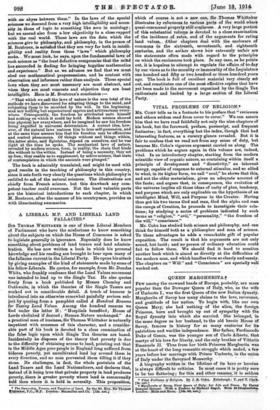VITAL PROBLEMS OF RELIGION.*
Ma. Cows tells us in a footnote to his preface that "reviewers and others seldom read from cover to cover." We can assure him that we have read faithfully not only the nine chapters of his book, but the foreword, preface, postscript, and frequent footnotes ; in fact, everything but the index, though that had interesting features, as a cursory glance revealed. But it is fair to confess that we read not from any sense of duty, but because Mr. Collu's vigorous argument carried us along. The problems which he argues again in this volume are, indeed, vital. In an introductory chapter, starting from the modern scientific view of organic nature, as containing within itself a principle of development and "directivity," an inherent energy, capable of response to external stimulus, and so allied to what, in its higher form, we call "soul," he shows that this, and not the older materialism, gives an adequate account of the facts; and argues that, in consequence, the evolution of the universe implies all those ideas of unity of plan, tendency, and purpose which are only explicable on the hypothesis of an intelligent Mind, Will, and Purpose in the Creator. Having thus got his two terms God and man, God the alpha and man the omega of Creation, he proceeds to investigate their rela- tions; by studying a series of problems indicated by such terms as "religion," "evil," "personality," "the freedom of the will," "conscience."
Mr. Cohn has studied both science and philosophy, and can think for himself both as a philosopher and man of science. To these advantages he adds a remarkable gift of popular exposition. The result is that his arguments are not only sound, but lucid ; and no person of ordinary education could fail to follow them. We should find it hard to mention another book which is aimed so directly at the difficulties of the modern man, and which handles them so clearly and sanely. The chapters on " Will " and "Conscience" are specially well worked out.










































 Previous page
Previous page